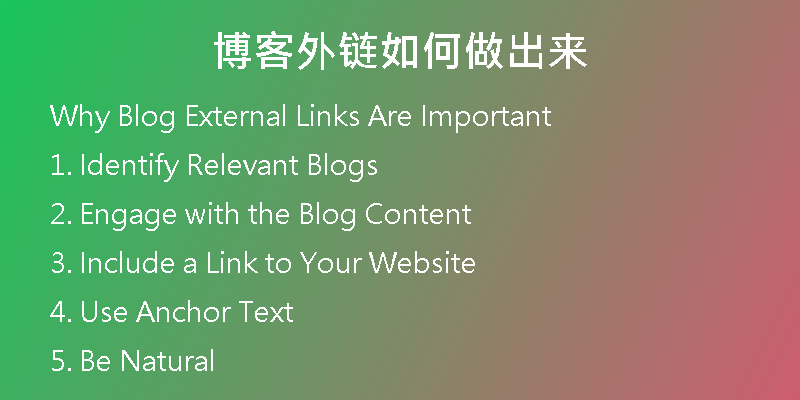Why Blog External Links Are Important
External links are an essential part of SEO. They help search engines understand what your website is about and determine its authority. External links can come from social media, directories, other websites and blogs. However, not all external links are created equal. The quality of external links matters. In this article, we will discuss how to get high-quality external links from blog commenting.

1. Identify Relevant Blogs
The first step is to find blogs that are relevant to your niche. This is important because you want the external link to come from a blog that is related to your website's content. There are several ways to identify relevant blogs:
Google search - Use your targeted keywords and search for blogs related to your niche.
Social media - Find influencers in your niche and see which blogs they follow and recommend.
Blogs you already follow - Check for external links in their blogs and see if they are relevant to your website's content.
2. Engage with the Blog Content
Once you have identified relevant blogs, it's time to engage with their content. This means reading their posts and leaving comments that are thoughtful and relevant. You want to show that you are a human and not a bot. Your comments should add value to the conversation and help other readers.
3. Include a Link to Your Website
In your blog comment, you should include a link to your website. However, not all links are created equal. You want to use your website's most relevant page for the link. For example, if you are commenting on a blog post about SEO, you would want to link to your website's page about SEO.
4. Use Anchor Text
Anchor text is the text that is hyperlinked. It is important to use anchor text because it tells search engines what your website is about. When choosing anchor text, use your targeted keywords. For example, if you want to rank for "SEO services," you should use "SEO services" as your anchor text.
5. Be Natural
When commenting on blogs, it's important to be natural. Do not force a link or anchor text. This will look spammy and can hurt your website's search engine rankings. Your comments should be organic and should add value to the conversation.
6. Focus on Quality, Not Quantity
When it comes to external links, quality is more important than quantity. One high-quality external link is more valuable than ten low-quality links. Be selective when choosing which blogs to comment on. Only comment on blogs that are relevant and have high authority.
7. Build Relationships
Building relationships with blog owners is essential. This will not only help you get external links, but it can also lead to collaboration and guest posting opportunities. Make sure to follow up with the blog owners after you leave a comment. Interact with them on social media and share their content.
8. Check for Broken Links
Broken links are links that no longer work. These can hurt the user experience of a website and can also hurt its search engine rankings. When commenting on blogs, check for broken links. If you find one, reach out to the blog owner and suggest a replacement link from your website.
9. Be Consistent
Consistency is key when it comes to external links. You need to be consistent in your efforts to get external links. This means commenting on relevant blogs regularly. Set a goal for how many blog comments you want to leave each week and stick to it.
10. Monitor Your Results
Finally, it's important to monitor your results. Use a tool like Google Analytics to track your website's traffic and see which external links are driving visitors to your website. This will help you identify which blogs are giving you the most valuable external links.
Conclusion
Getting high-quality external links from blog commenting is an important part of SEO. It can help improve your website's search engine rankings and drive traffic to your website. By following the tips outlined in this article, you can get high-quality external links that will benefit your website.



